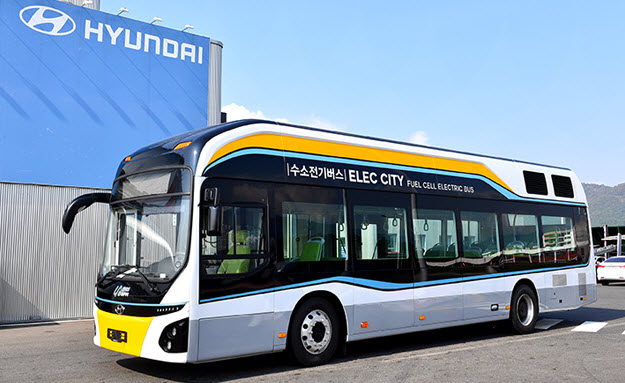
- Cities including Seoul, Gwangju, Ulsan, Seosan, Asan and Changwon
- The hydrogen bus will be put into the regular city bus routes
The Ministry of Environment (minister Kim Eun-kyung) announced that it plans to carry out a pilot project to put 30 hydrogen buses on six city bus lines across the country for two years starting from 2019 in order to improve the urban air environment, specifically fine dust particles.
A ministry spokesman said, “Vehicles contribute to over 65 percent of air pollution in large cities, with much of it originating from large diesel vehicles,” he continued, “It is urgent to replace diesel buses with eco-friendly ones for the health of our citizens.”
The pilot project is to secure technological feasibility prior to the full-scale roll-out of the hydrogen bus in the second half of 2020 and to resolve difficulties that may arise during the operation.
Six cities including Seoul, Gwangju (Ulsan), Ulsan, Seosan, Asan and Changwon were selected as demonstration cities.
The final number of hydrogen buses in these cities will be finalized in December this year, after the National Assembly finalizes its budget for the coming year.
Considering the production schedule of hydrogen buses, it is estimated that the time of hydrogen buses will actually be around March ~ April next year.
Lee Ki-joo, director of the Environment Department at the Ministry of Environment, said, “We will organize a consultative body with local governments participating in the pilot project to periodically review the preparations for the pilot project and improve the difficulties that will arise in the future pilot project.”
The cost for the fuel-cell bus is expected to be around 830 million won ($742,771), with the Ministry of Environment and city governments sharing the costs. Hyundai Motor, which makes the fuel-cell vehicles, will assume costs of more than 200 million won for each bus and provide technical support.
The Ministry estimates that By 2022, it will plan to increase the total number of fuel-cell vehicles in Korea from the current 465 to 15,000, and increase the number of fueling stations from 9 to 310.
Read the most up to date Fuel Cell and Hydrogen Industry news at FuelCellsWorks




